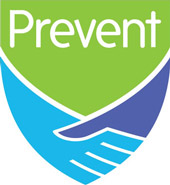Report radicalisation or extremism (Prevent)
The aim of the Prevent Strategy is to stop people becoming terrorists or supporting terrorism. Prevent tackles all forms of extremism – including both Islamist extremism and far right threats.
Prevent has 3 key objectives:
- tackle the ideological causes of terrorism
- intervene early to support people susceptible to radicalisation
- enable people who have already engaged in terrorism to disengage and rehabilitate.
We all have a role in protecting vulnerable children, young people and adults from being drawn into terrorism, keeping Kent, Medway and the people here safe.
Extremism and radicalisation in our community are very real threats, and being aware is the first step. You can help to reduce the threat from terrorism, radicalisation and extremism.
- Be vigilant - go to the Action Counters Terrorism (ACT) website to find out what to look out for.
- Know what to report.
- Report it.

Report a concern or make a referral
If you have any immediate concerns about the welfare of anyone contact the police, call 999.
To speak to someone about your concerns before making a referral, email the Prevent team at prevent@kent.gov.uk. If you're a member of the public, you can also call the ACT Early Support Line on 0800 011 3764.
To make a referral to Prevent, download and complete the National Prevent Referral Form and email it to preventreferrals@kent.police.uk.
Download the referral form (PDF, 281.0 KB)
You can also visit the Met Police website to report possible terrorist activity or GOV.UK to report online material promoting terrorism or extremism.
Terrorist attacks can sadly lead to spikes in hate crime against certain groups, with many people feeling vulnerable. Hate crime is not tolerated, is taken extremely seriously, and should always be reported.
- You can report hate crime to Kent Police.
- Get guidance on how to report hate crimes.
How we are working to prevent terrorism and extremism
We work with individuals and communities by using voluntary early intervention to encourage them to challenge extremist and terrorist ideology and behaviour. This can involve:
- support in schools, youth hubs, community groups
- promoting positive values and community cohesion
- protection from extremist dialogues
- encouraging safe and open debate and critical thinking
- encouraging reporting of concerns
- engaging in positive activities
- engaging in open and honest dialogue around Prevent.
Early intervention and support
Channel is a key element of the Prevent Strategy and provides early support for anyone who is vulnerable to being drawn into any form of terrorism or supporting terrorist organisations, regardless of age, faith, ethnicity, or background.
Channel uses a multi-agency approach to identify and provide support to individuals who are at risk of being drawn into terrorism, including people holding and expressing violent extremist views. The overall aim is early intervention and diverting people away from potential risk.
While it remains rare for children and young people to become involved in terrorist activity, young people from an early age can be exposed to terrorist and extremist influences or prejudiced views. As with other forms of safeguarding strategies, early intervention is always preferable.
Find out how we'll use your data if you're referred to Channel by reading the KCC Channel Panel privacy notice.
Where to get more information
- You can read more about Prevent and Channel on the Kent Safeguarding Children multi-agency partnership website.
- You can read about Prevent in schools on the Kelsi website.
- To understand the support Prevent can offer go to the ACT Early website.
- Find out more about Prevent on GOV.UK.